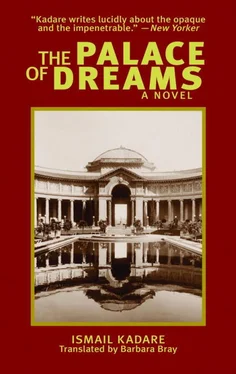Then another rhapsodist started to sing “The Ballad of the Bridge,” and through the hush that surrounded it, Mark-Alem seemed to hear the blows of the masons, building in the cold sunshine a bridge sullied with the blood of sacrifice. A bridge that would not only give the Quprili family its name but would also mark them with its own doom.
Though his chest was constricted with tension, Mark-Alem suddenly felt an almost irresistible desire to discard “Alem,” the Asian half of his first name, and appear with a new one, one used by the people of his native land: Gjon, Gjergj, or Gjorg.
Mark-Gjon, Mark-Gjergj Ura, Mark-Gjorg Ura, he repeated, as if trying to get used to his new half name, every time he heard the word “Ura,” the only one of the rhapsodist’s words he could understand.
Suddenly there came back to him the dream of a certain merchant, about a musical instrument heard in the middle of some wasteland. He couldn’t remember the details—only that he’d felt like throwing it into the wastepaper basket at first but then had let it pass. And now it seemed to him that the musical instrument described in the dream bore a strange resemblance to the lahuta.
The rhapsodist went on singing in the same resonant voice. Kurt gazed fixedly at him; his eyes were shining feverishly. Every so often, in a whisper, he translated a passage, a few verses, to the Austrian, who was also listening intently. The Vizier stood motionless, the rings under his eyes darker than ever, his hands folded in front of him. Mark-Alem could get the drift of a few lines here and there, but most of them were unintelligible.
Thou hast found a grave,
O thou, bound by the bessal [2] Promise.
Almost imperceptibly he moved nearer to where his young uncle and the Austrian were. Kurt was just trying to translate that line. Mark-Alem, who understood a little French, listened.
“It’s extremely difficult to translate,” Kurt was saying. “Almost impossible, in fact…”
Mark-Alem did his best to follow the text of the epic, partly through what he could make out for himself and partly by listening to Kurt’s translation.
“It’s about a man trying to challenge his dead enemy to a duel on his grave,” Kurt explained to the Austrian. “Rather macabre, eh?”
“Magnificent!” replied the other.
“The dead man can’t get up, and he struggles and groans,” Kurt went on.
My God, thought Mark-Alem suddenly, it’s all quite clear! And indeed it couldn’t be plainer. The sounding box of the lahut a was the grave in which the dead man was struggling. His groans, arising from below, were uniquely terrifying.
“And now here are the owls, birds of ill omen,” whispered Kurt.
The Austrian nodded agreement as his friend spoke.
“This is the knight, Zuk, treacherously blinded by his mother and her lover, who wanders over the snowy mountains on his blinded steed.”
“Blinded by his mother! My God!” exclaimed the Austrian. “But it’s like the Oresteia! Das ist die Orestiaden! ”
Mark-Alem was now quite close to them, so as not to miss a word of what they said. Kurt was just about to go on with his commentary when there was a sudden noise. Heads turned in all directions, some toward the doors, some toward the windows. Then the noise came again, mingled with shrill cries, and then amid all the din there was a loud banging at the outer door.
“What is it? What’s happening?” cried anxious voices. Then all were silent. The rhapsodist stopped singing. There was another knocking, louder than before.
“My God, what can it be?” gasped someone.
Everyone turned toward the Vizier, whose face had suddenly turned deathly pale. There was a distant sound of a door opening, then a brief cry, followed by the tramp of approaching footsteps. The guests stood petrified, gazing at the drawing-room doors. These were finally shoved open roughly, and a group of armed men appeared on the threshold. Something—perhaps the lights in the room, or the sight of the guests, or the cry that issued from some unknown throat—seemed to stop them in their tracks for a moment. Then one of them came forward, scanned the room apparently without finding what he was looking for, and said:
“The Sovereign’s police!”
No one said anything.
“Vizier Quprili?” said the officer, having now evidently found the person he sought. He took a couple of steps toward the Vizier, bowed deeply, and said:
“Excellency, I have orders from the Sovereign. Allow me to execute them.”
Then he brought out from his breast a decree, which he proceeded to unfold as the Vizier looked on. His white face didn’t change now; it had changed as much as it could already.
The officer took his impassiveness as permission.
“Your papers!” he shouted, turning suddenly to the guests and nodding to his men to enter.
There were about half a dozen of them, all armed, and wearing the badges of the imperial police on their caps and collars.
“I’m a foreign citizen,” the voice of the Austrian could be heard protesting amid the rising hubbub.
Mark-Alem looked around in vain for his mother. A voice that was meant to be severe but which tried to avoid brutality was saying at intervals: “This way! This way!”
Someone had opened a side door leading into the adjoining salon, and a group of guests was being herded into it.
“Kurt Quprili!” shouted one of the policemen, pointing Kurt out to his chief. “He’s the one.”
The officer went over to him, taking some handcuffs out of his pocket on the way.
Mark-Alem saw the officer grab Kurt’s wrists adroitly with one hand and fix the handcuffs on them with the other. Strangely enough, Kurt didn’t offer the slightest resistance. All he did was look at the handcuffs in surprise. Mark-Alem, like some of the other guests, turned to the Vizier, expecting him to put an end to this absurd scene. But the Vizier’s face remained expressionless. Anyone else might have thought the powerful Vizier’s failure to respond to an outrage committed under his own roof had something to do with fear. But Mark-Alem guessed there was another reason for his resignation. This was the ancient reflex of the Quprilis, who in similar circumstances, scores of times in the history of their family, assumed the mask of unreality. Its features reflected fatalism, abstraction, and weariness.
Mark-Alem felt like shouting, “Wake up, Uncle, pull yourself together!—don’t you see what’s happening?” But in the eyes of the Vizier, even while with everyone else he watched Kurt being led out, there was a trace of what looked like submission. You suspected he was really looking into the distance, into some mysterious depths where the official machine that had engendered this misfortune might have been set in motion.
I only hope he’s thinking of a way to stop it, thought Mark-Alem, approaching the Vizier in an attempt to see if this were so. And perhaps because he was so close, perhaps by mere chance, their eyes briefly met. In that short time, in the look that sprang as through a rift in his uncle’s brow, it seemed to Mark-Alem that he understood the meaning of their previous incomprehensible interview. And suddenly, painfully, he was transfixed by the thought that all this had to do with the Palace of Dreams and with himself, Mark-Alem; and that this time the Quprilis had probably been caught out….
He felt two hands pushing him roughly toward the door into the other room. As he went in he caught a glimpse of the rhapsodists, still standing alone amid a small crowd of guests.
“Mark!” He heard his mother’s gentle voice as soon as he entered the smaller salon. He would have expected a cry or a sob, but she sounded almost calm. “What’s happening in the other room?”
Читать дальше












